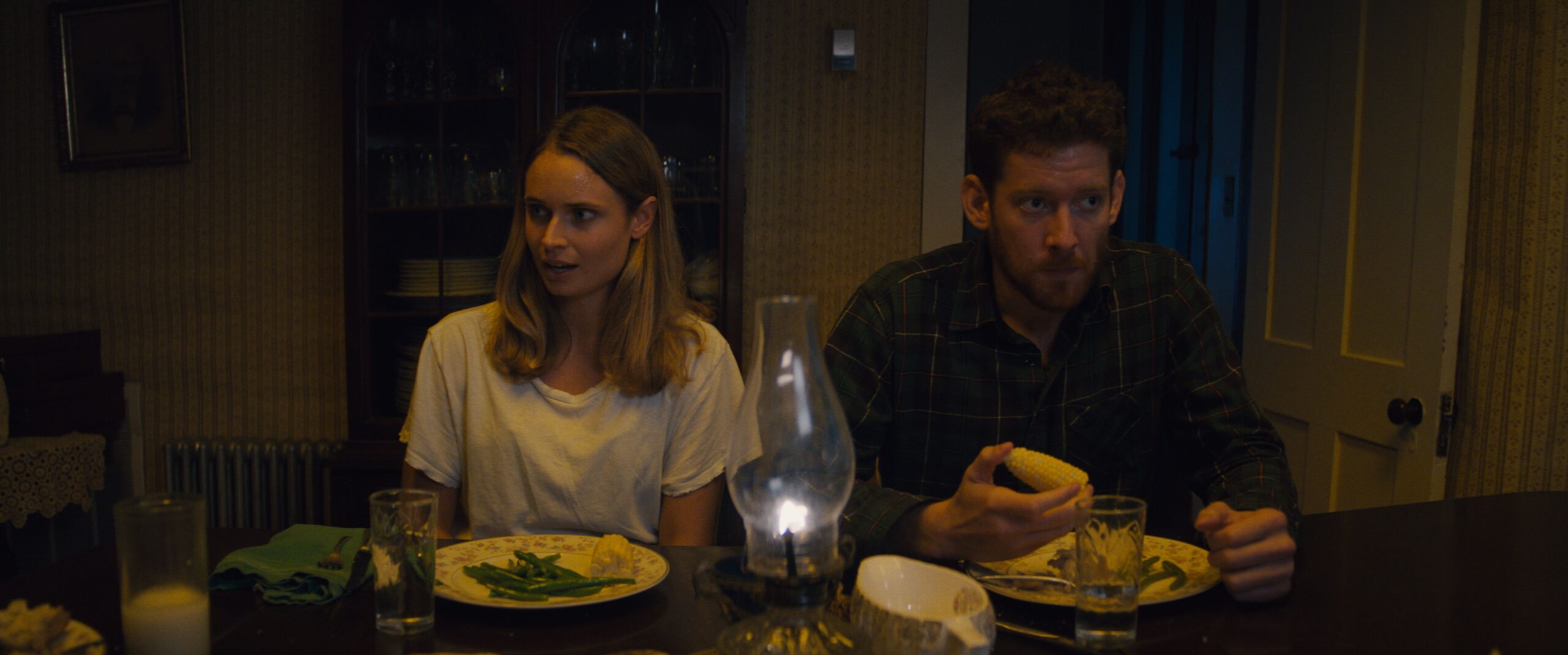Traveling can always be a crapshoot, especially when you don’t really have anywhere to stay except a tent. While you may think that provides you the ultimate flexibility, sometimes you accidentally pitch it on an unfriendly farmer’s land. Perhaps a farmer named Eulis (Stephen D’Ambrose) who promptly asks you to pack up and get moving. Rylie (Malin Barr) and Sam (Sawyer Spielberg) get to live through this nightmare in Honeydew, except that’s just the tip of the iceberg.
Riley and Sam find themselves stranded due to the battery in their car dying. Wandering aimlessly looking for help, they stumble upon the home of Karen (Barbara Kingsley). The outdated appliances and décor make Karen’s home seem to be stuck in the past. Rylie and Sam questionably ignore Karen’s incredibly odd and unnerving behavior – a mix of absentmindedness, extreme friendliness, and downright creepiness – and accept an invitation into her home.
 Karen quickly convinces them to not call AAA and instead wait for her neighbor to come fix their car. In the meantime, she’ll prepare a meaty dinner for them, Rylie’s vegan ways be damned. A dinner that surpasses the lemon wedges and sugar her bandaged and mentally challenged son Gunni (Jamie Bradley) is eating. Naturally Karen’s neighbor doesn’t show up, so of course Rylie and Sam stay overnight in a leaky and grimy basement bedroom. If everything leading up to this point didn’t raise enough red flags for them to leave, then they probably deserve the horrors that await them.
Karen quickly convinces them to not call AAA and instead wait for her neighbor to come fix their car. In the meantime, she’ll prepare a meaty dinner for them, Rylie’s vegan ways be damned. A dinner that surpasses the lemon wedges and sugar her bandaged and mentally challenged son Gunni (Jamie Bradley) is eating. Naturally Karen’s neighbor doesn’t show up, so of course Rylie and Sam stay overnight in a leaky and grimy basement bedroom. If everything leading up to this point didn’t raise enough red flags for them to leave, then they probably deserve the horrors that await them.
Honeydew is the feature length debut for writer/director Devereux Milburn, based off a story he and Dan Kennedy wrote. It is also the debut of Sawyer Spielberg, Steven Spielberg’s son, in a leading role. Spielberg does a decent job, but there is not too much to work with in Honeydew. Kingsley is the one who truly steals the show. Karen is a chilling character who always has a hint of evil behind her smile.
 Instability and tension are at the core of almost every aspect of Honeydew. From Rylie and Sam’s rocky relationship, Karen being all over the place, and the perilous situation the couple finds themselves in – there are few moments of peace. Milburn amplifies this with an onslaught of unsettling noises and images throughout the film. From the opening scenes of stammering prayers, a litany of strange shots, and bold editing choices, Milburn does all he can to make you uncomfortable for the duration of the film. In Milburn’s quest to make the audience unnerved, he may have gone too far. The audio and visuals become tiresome, losing their purpose as the same scenes and sounds are recycled. Images and noises that once carried a feeling of dread become dull as the film carries on.
Instability and tension are at the core of almost every aspect of Honeydew. From Rylie and Sam’s rocky relationship, Karen being all over the place, and the perilous situation the couple finds themselves in – there are few moments of peace. Milburn amplifies this with an onslaught of unsettling noises and images throughout the film. From the opening scenes of stammering prayers, a litany of strange shots, and bold editing choices, Milburn does all he can to make you uncomfortable for the duration of the film. In Milburn’s quest to make the audience unnerved, he may have gone too far. The audio and visuals become tiresome, losing their purpose as the same scenes and sounds are recycled. Images and noises that once carried a feeling of dread become dull as the film carries on.
Another issue is that Honeydew seems to lack any true substance which greatly impacts the quality of the film. Rylie and Sam’s strange relationship precludes you from truly caring about either character. They complain and take shots at each other, the honeymoon clearly being over. In typical horror fashion, the two make stupid decision after stupid decision – even after Riley discusses the PhD track that she is on.
Milburn does not overdo the gore in Honeydew – leaving many aspects off camera and just alluding to them. This can be a successful tactic, especially for budget conscious productions. He does, however, include images that are tough on the eyes in different ways. The problem is it’s too little, too late. By the time the film gets to the real horror it has already lost it’s luster. Honeydew is just another subpar horror film that is deficient in scares and depth causing it to be a forgettable debut for its director and star.
